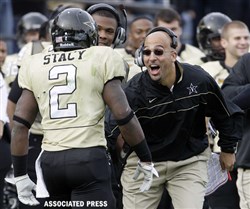VOL. 36 | NO. 50 | Friday, December 14, 2012
Vandy finally finds academic-athletic balance. Can the Vols?
By Brandon Gee
When Vanderbilt University brought a top-20 national football prospect to campus earlier this year, coaches brainstormed potential recruiters and made a call – to the Blair School of Music.
It is perhaps unexpected that Mitchell Korn, an adjunct professor of music and community, would be asked to help woo a football recruit, but it is in fact a great example “of how VU football operations thinks ‘out of the box,’” Korn says, “in this case understanding how important music is to the recruit and finding a faculty member who could speak to him about Blair School, Nashville and the music business.”
It’s a type of thinking that has become commonplace within Vanderbilt athletics in the decade since former Chancellor Gordon Gee (no relation to the author) made the splashy, controversial – and in some circles, widely ridiculed – decision to radically restructure the athletics department by bringing it under the thumb of the university’s broader academic administration.
The thought was that both sports and academics would benefit from more fully integrating student athletes into the private university and making their experience more similar to those of students who came strictly for Vanderbilt’s sterling education.
And, in the face of doubts and fears that Vanderbilt athletics would slip to club or intramural quality, the model has worked. Vanderbilt has achieved sports success unlike any in its history without sacrificing academic achievement. Vanderbilt student-athletes have a cumulative GPA higher than 3.0 and a 92 percent graduation rate.
Similar thinking led the public University of Tennessee in 2010 to reorganize its athletics department so that it began reporting to the UT-Knoxville campus chancellor rather than the statewide UT system president.
“By bringing this position (athletic director) into our overall campus leadership group, we are reinforcing our firm belief that athletics and academics must work hand-in-hand for the good of our students,” Chancellor Jimmy Cheek wrote in 2011.

Vanderbilt head coach James Franklin greets running back Zac Stacy after a touchdown earlier this season. The senior became VU’s career rushing leader this season, breaking a 33-year-old record.
-- Ap Photo/Mark HumphreyWhile Vanderbilt has seen historic success following a move to blend athletics and academics, and UT might well see similar results in 10 years, some Big Orange programs have sunk to new lows in the eyes of fans. And many are unhappy, inundating Board of Trust members with complaints that the school’s academic administration is obstructing the football program.
Making UT’s slide even harder to take is Vanderbilt’s recent successes, which include the baseball team going to the College World Series, the men’s basketball team going to the Sweet 16 and winning its first SEC tournament in 61 years, and the football team going to two consecutive bowl games for the first time in school history. All four “revenue sports” (men’s and women’s basketball, football and baseball) participated in postseason play last year.
At UT, women’s basketball has remained the lone bright spot, winning the SEC last season and advancing to the Elite Eight of the NCAA tournament. Baseball had a losing record in 2012, and the Volunteers most recently concluded men’s basketball and football seasons punctuated by losses to in-state rivals UT is accustomed to dominating.
The basketball team closed its season with a loss to Middle Tennessee State University in the second-fiddle NIT tournament, while Vanderbilt defeated UT in football in Nashville for the first time in 30 years, prompting the dismissal of coach Derek Dooley after three years.
New coach Butch Jones is inheriting a program at its lowest point in more than 100 years.
The Vols were 2-14 in the SEC the past two years, 5-19 during Dooley’s tenure. They finished 2012 with a 5-7 overall record to post their third consecutive losing season, the first time that has happened since the 1909-11.

Butch Jones, left, newly named football coach for the University of Tennessee, poses for photos with athletic director Dave Hart during the press conference to announce his hiring.
-- Ap Photo/Chattanooga Times Free Press, Patrick SmithBut Nashville sports radio host Doug Mathews, who spent 10 years as running backs coach and defensive coordinator at UT, doesn’t believe coaching deserves as much of the blame as it has been receiving.
“It’s much more institutional than it has been coaching,” says Mathews, adding communication and coordination between athletic and academic officials has gone by the wayside since the retirements of former President Joe Johnson and former Athletic Director Doug Dickey in 1999 and 2002, respectively.
“Admissions have become much more stringent, and the curriculum for athletes has become much more difficult.”
Mathews says the cooperation between admissions and academics has eroded to “an irreparable point,” and that the reorganization deserves some of the blame.
“It’s a big deal because the chancellor of the university reports to the Faculty Senate, and the Faculty Senate in most instances is not real interested in having a real strong athletic program,” Mathews says. “The chancellor is between a rock and a hard place. If he supports the athletic department in curriculum and admissions, then the academic folks are mad at him.
“Those sorts of concessions for athletes aren’t a big deal when you consider the size of the university and the return on investment. The problem is when the chancellor has to sign off on it and face the faculty.”
UT athletic and administration officials did not respond to multiple requests for comment. In announcing their hiring of Jones, though, the school touted his academic credentials.
“A staple of Jones’s program has been success in the classroom,” the news release announcing Jones’ hiring states, “and the 2011 (University of Cincinnati) Bearcats were also the only program nationally to win both its conference championship and its league top academic honor, earning the 2010-11 Big East Team Academic Excellence Award.”
And in a letter to UT Board of Trust Vice Chair Don Stansberry that was posted online, Cheek responded to concerns whipped up by Mathews and said he is striving for “comprehensive excellence … in both athletics and academics.”
“Each university has its own set of unique admissions policies; however, I have consulted with other SEC schools, and our policies ARE consistent with our competitors,” Cheek wrote. “We do have procedures in place that allow us flexibility in admissions.”
Vanderbilt supporters, meanwhile, couldn’t be happier with the school’s leadership, particularly David Williams, the athletic director, law school faculty member and vice chancellor for athletics and university affairs.
Until July, he also was Vanderbilt’s general counsel and university secretary. In his varying roles, Williams has forged relationships and mutual respect with trustees and faculty to a degree unlike your typical athletic director.
“He is a member of the senior leadership team of the university,” Vanderbilt athletics spokesman Rod Williamson says. “As they say, he has a seat at the table. He’s in a great position to understand university goals and challenges, and he’s effectively able to communicate our goals and challenges.”
“There used to be a view around Vanderbilt from academia that the word student-athlete was an oxymoron. David Williams, more so than any other person, has changed that view,” adds Lew Conner, a former Vanderbilt golfer who has stayed actively engaged with university athletics for 56 years.
“The professors at Vanderbilt actually believe that the student-athlete can be superb at both. The change in view has been a dramatic, positive change. They’ve done it at Stanford for a long, long time. They’ve done it at Duke for a long, long time. And now they’re doing it at Vanderbilt. I’ve never been as excited about the future of Vanderbilt athletics as I am today.”
The university also has, to use their marketing phrase, gone “all in” by ponying up the money necessary to build and improve facilities, to hold on to successful coaches and to scour the globe for talent.
“The best example of that is when you get the right coach; you tear his contract up not once, but two years in a row,” Conner says of football coach James Franklin. “That’s unheard of in the annals of Vanderbilt history.”
Most importantly, Williamson says, Vanderbilt has learned to be true to itself to succeed because of and not in spite of its academic excellence, to hone in on that recruit who will be just as interested in the quality of Vanderbilt’s music programs as its football operation.
“At this place, you can’t hide. We don’t have basket-weaving classes,” Williamson says. “Our best coaches use academics as a plus. Our pool (of potential recruits) might be a little smaller, but it is a very, very quality pool.
“I think we used to have an attitude that we were just like everybody else in (in the SEC). I think we felt like we had to do that to be attractive. We’re not just like everybody else. We’re a smaller academic school. Now we have coaches willing to talk about our differences. We are not ashamed to say we are different. It’s a lot more credible.”